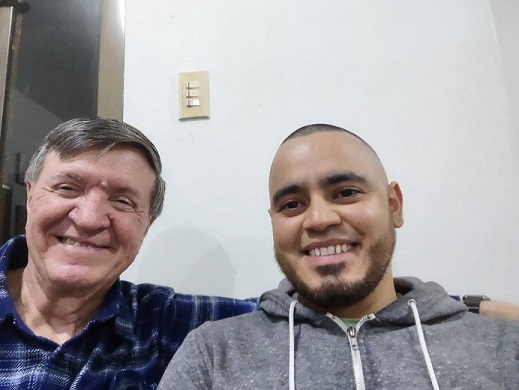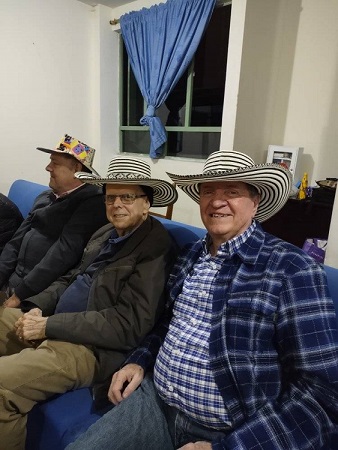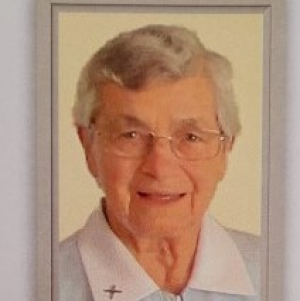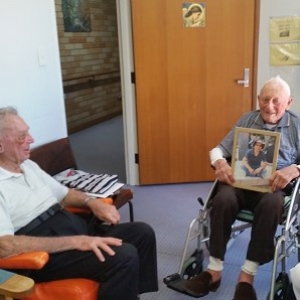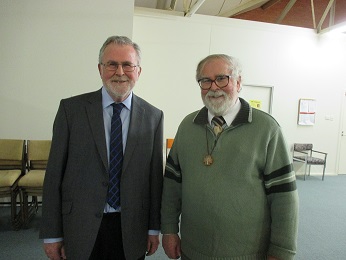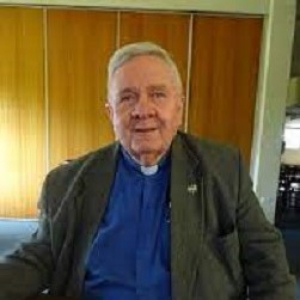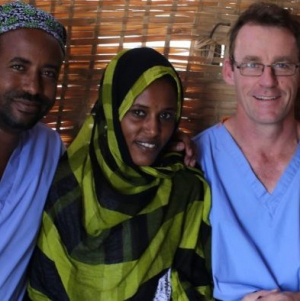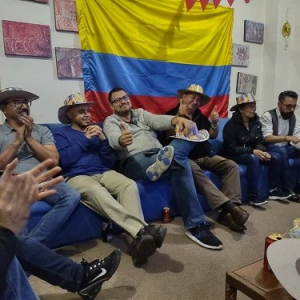Peter MALONE
Cyrano
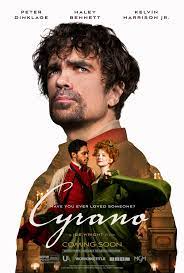
CYRANO
UK/US, 2021, 124 minutes, Colour.
Peter Dinklage, Haley Bennett, Kelvin Harrison Jr, Ben Mendelsohn, Monica Dolan, Bashir Salahuddin, Ruth Sheen, Mark Benton, Richard McCabe.
Directed by Joe Wright.
Cyrano, Cyrano de Bergerac must be one of the most romantic characters in fiction. Created as a verse play by Edmond Rostand in 1897, his story has been told and retold, with Jose Ferrer winning an Oscar for the 1950 Cyrano de Bergerac, later Gerard Depardieu as Cyrano, and a contemporary version with Steve Martin in Roxanne.
Cyrano is a man of unrequited love – or his love being requited by Roxanne as simple friendship. But Cyrano is a man of unconditional love, devoted to Roxanne, and finding the outlet for his passion in writing letters for the handsome guard, Christian, even providing his voice in the famous balcony scene where Roxanne is in love with Christian’s soul, his poetry. Which, of course, is the soul of Cyrano.
This present version, directed by Joe Wright (Atonement, Pride and Prejudice, Anna Karenina, Darkest Hour) is a musical. The book was written and staged by Erica Schmidt and she has written the screenplay – this project also a work of love because Peter Dinklage and Erica Schmidt are married in real life.
One of the most famous characteristics of Cyrano de Bergerac was his long nose. However, no long nose in this version. Rather, the film uses Peter Dinklage’s form of dwarfism, lack of development in his bones, to make him distinctive, and sometimes the butt of mocking humour. (Peter Dinklage’s successful film and television career, especially with Game of Thrones making him known worldwide, has become a significant icon for dwarfism, audiences accepting him for his characters rather than focus on his physical condition.)
So, while the film traces the basic tale of Cyrano and his devotion to Roxanne (Haley Bennett who worked with Peter Dinklage in the stage version), her infatuation with the handsome Christian (Kelvin Harrison Jr), the romanticism of the wooing by literate letters, it also shows Cyrano as a master swordsman and, at the end, in vivid war sequence in snowy mountainous terrain leading to deaths.
The musical aspects of the film, the songs, their dramatisation, the elaborate choreography surrounding many of them, the melodies, may not appeal to audiences whose sensibilities do not extend to musicals. However, with the power of the story and Peter Dinklage’s performance, these audiences may be won over and, finally, be moved and identify with the characters.
Audiences who do enjoy musicals will be amazed at the quite lavish sets, from 17th century theatre performance (and mockery) to the military training grounds, to the battle in the snow, big cast, especially for the staging of some of the songs, and elaborate choreography.
Much of Cyrano was filmed in Sicily with the atmosphere of life in the 17th century.
And, there is an interesting supporting cast, led by Ben Mendelsohn as the Duke of Guise, Monica Dolan as Roxanne’s maid, Marie, Richard McCabe as the officiating priest.
But, it is the focus on Cyrano himself and Peter Dinklage’s presence and performance. He is not the greatest of singers (perhaps better if we think of him in the tradition of Lee Marvin in Paint Your Wagon or Rex Harrison’s recitative style in My Fair Lady). He is adept with the sword, delivers his romantic lines and aspirations with aplomb, and, at times, especially in the final sequences, the longing in his eyes is extraordinarily moving.
Doubtless there will be other versions of Cyrano de Bergerac – but, in its imagination and in the casting of Peter Dinklag and the repercussions of his dwarfism, this is a very distinctive version.
- The popularity of Edmond Rostand’s character and play? The romantic hero? Limitations? Poetic?
- Audience knowledge of the various versions of Cyrano, Jose Ferrer, Gerard Depardieu, Steve Martin?
- A musical version, the songs and melodies, insertion throughout the film, characters, situations? Romance? Sadness? Atmosphere of war? The range of lyrics, commenting on the characters and situations? Revelation of characters?
- The lavish production, sets, recreation of the period, France and the 17th century, costumes and decor? The background musical score?
- The original play, verse, rhymes? Incorporated into the screenplay?
- The opening, the theatre, the audience and crowds, the actor, sets and style, audience participation? The vanity of the actor? The challenge by Cyrano? Defiance, insults, confrontation, scaring the actor away? The audience liking the actor, then taking Cyrano side? Criticisms?
- Peter Dinklage as Cyrano, not having the traditional long nose, his dwarfism, the dramatic effect, on Cyrano as a person, character, interactions with others, looked down on, friends?
- The introduction to Roxanne, age, poor family, Marie as her assistant? The various suitors? Duke of Guise? His taking her to the theatre, her wanting to see the play, leading the Duke on? Costumes and dresses? She being serious and flighty? Her friendship with Cyrano, growing up with him, not aware of his love for her, but relying on his devotion?
- The arrival of the guards, her glimpsing Christian, the instant infatuation, his response to her? His arrival, the reaction of the guards, his capacity for fighting? The various offices?
- Cyrano, his life, poetry, friendships, place in the military? His swordsmanship? The challenge in the theatre, the fight, his skills, vanquishing his mockery? His realisation about Roxanne and Christian, her asking Cyrano to help him, especially in the barracks? Cyrano agreeing, meeting him, reluctance but sincerity?
- The war situation, the Duke, the command of the king, having to go to battle, his visiting Roxanne, her ambiguous response, his going to war? Leaving the guards behind? The later change, the guards going, Christian and Cyrano, the long time in the mountains, the winter?
- The basic familiar situation, Christian, not having a poetic talent, Cyrano writing the letters, pouring out his own heart, Roxanne and her dismissive responses, in love with the words, with the soul of the poet? Christian going, his awkwardness, Roxanne’s reaction to his being inarticulate? The balcony scene, Cyrano supplying the words, Cyrano eventually speaking them?
- The contriving of the wedding, the priest arriving with the message from the Duke, Roxanne and her marrying Christian, the Duke arriving, upset, Roxanne’s seeming betrayal? His sending the guard to the mountains?
- The time in the mountains, Christian pining for Roxanne, Cyrano sending the letters every day, Christian eventually seeing what was happening, the final letter, the blood, Christian going to the mountaintop, his death?
- Cyrano and his return, his wound, Roxanne meeting him, the final letter, her realising the truth, getting him to read that final letter? His death?
- The basic plot, the range of the songs, each of the characters, the revelations? The importance of the dancing, the choreography, the costumes and style, soldiers, theatre?
- How effective having Cyrano to Bergerac as a musical?
Blind Ambition/ 2020
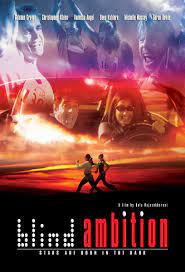
BLIND AMBITION
Australia, 2021, 96 minutes, Colour.
Directed by Warwick Moss and Rob Cohen.
There are two principal audiences for this quite engaging documentary. The first audience would be those who are wine-lovers. The film gives them the opportunity for some vicarious wine-tasting as they follow the careers of four sommeliers, information about the world competition in Burgundy for wine tasters, preparation and training for the competition, the coaches, a tour of vineyards in France and Germany, the competition itself.
The second audience, who might not be interested in wine at all, are those who are concerned about refugees around the world in the 21st-century, especially African refugees and, more particularly, refugees from Zimbabwe in the first decade of the 21st-century, refugees from the ever worsening Mugabe-Zimbabwe, stranded at the borders with South Africa, being smuggled into South Africa to make their lives there, sometimes with their wives, often having to leave their children behind in Zimbabwe till they made good.
And, there is the audience who is interested in both themes.
The focus of the film is on four Zimbabwean men who decided to leave their home country, taking their wives but leaving their children behind until better times, who experience the brutality of the border groups, smuggled by train and find their way to Cape Town. Each of them has made quite a success of his life – each of them learning wine tasting even though there is minimal wine in Zimbabwe. They become expert and are employed as sommeliers in top restaurants. We meet them as a group. We meet them each personally. And we see Joseph’s mother back in Zimbabwe with a newspaper article acclaiming him on her wall.
The men become the team for Zimbabwe at the 2017 competition in Burgundy. Quite an amount of time is spent on their working together, pooling their gifts at tasting and understanding the wine. And they have a South African trainer who explains situations and his work to the audience. He is also the trainer of Team South Africa and wants the two teams to bond rather than be arch-competitive rivals. Money is raised around the world to get them to France, social media support and affirmation.
In France, they have a coach who previously was the winner of world competitions, Denis. There is quite some introduction to him, his speaking tongue-in-cheek to the camera, yet a pompous man, proud of his not being liked! He accompanies the men on their trip around France and Germany but clashes with the South African coach.
Then, the competition, 12 wines to be tasted and identified, the tension as the four sit around their table with Denis. At times they are quite a riled by his interventions! We see the discussions, the tasting, the tension, the time limits.
The team hope that they will not come last and, surprisingly, Italy comes last. They come 23rd. But, they return home to great acclaim, symbols for Zimbabwe. And, at the end, quite an affirmation of each of them as they produce their own wines, or go to Hong Kong to raise money for charity, and one migrating with his family to the Netherlands and becoming an importer of African wines.
More cheer. They go back in 2018 – and improved by nine places!
(Interestingly, this is a Screen Australia production.)
Neighbours/ 2020
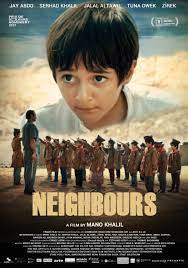
NEIGHBOURS
Switzerland, 2021, 124 minutes, Colour.
Serhed Khalil.
Directed by Mano Khalil.
The northern part of Syria where Kurds live is not so often seen in cinema. Here the audience is invited to go back several decades, meet the Kurds, especially a Kurdish family, who, in fact, live next door to a Jewish family which had settled in the area. They are the neighbours.
The wonderful thing about the film is that the central character is a little boy, Sero, and we see the characters and the events through his eyes. He is first seen with his mischievous uncle secretly releasing balloons in the air, with the Kurdish colours, very quickly fired on by Turkish border guards. Sero lives with his mother and father, with that same mischievous uncle, his father’s parents and a little baby sister. The father of the Jewish family runs a store in the village, supported by his wife, but very concerned about their young daughter, Hannah, wanting to help her escape from the region.
The Kurds seem to have come to a state of living with tension, especially with the Turkish border and a huge notice in stones on the side of the adjacent hill extolling Turkey. At one stage they try to visit Sero’s mother’s parents at the border, 15 minutes, continually harassed by the border guards.
The family seem to have settled into this way of life, staying in the village, sometimes a visit to the city for a visit to a gynaecologist or to visit officials issuing passports (with a succession of refusals and then acceptance of bribes).
But, a teacher from the city arrives, highly political, classes in Arabic (which Sero does not understand). The teacher is full of Syrian propaganda, seeing the president as the Fuhrer and everybody saluting the flag with a Sieg Heil gesture. And, into his propaganda come anti-Semitic myths, tales that Jews trap little children to kill them and to make cakes with them. Despite his friendship with his neighbours, lighting candles for them on Sabbath, Sero absorbs this anti-Semitic propaganda. The teacher administers corporal punishment, is demanding of the children to speculate on how to eliminate the Jews, having a huge doll which they practice stabbing, organising a play where each of the children has a map of the Arab states, his advocating pan- Arabic union and the speaking solely of Arabic.
The drama has to come to a head. There is a tragic accidental shooting by a Turkish guard and the death of Sero’s mother. The Jewish family then suggest to his father that they might be able to use the dead mother’s identity to smuggle out their daughter. Sero’s father is a good man, self-sacrificing, wanting to do the best.
In fact, the story is Sero remembering his past, and a glimpse then of Sero at detention camps on the border, an older man, and a Swiss delegation with the woman asking him to identify the people in the photo that she has. Yes, it is a reunion.
- Perspective on the Kurds and their life in northern Syria? Bordering Turkey? A Jewish presence?
- The landscapes, village, homes, streets, school, the border Hill, the camps? The musical score?
- The title, Kurds, Turks, Jews? Language, Kurdistan, Arabic? Neighbours and enmities?
- The opening, Sero and his uncle, mischievous, the balloons, shot down? The right tone?
- Sero’s story, at home, his parents, the bonding with them? Brother, the baby? His age, play, the Kurdish situation, the Turks? Going to school, the teacher, Arabic, not understanding, treatment at school? The indoctrination? His friendship with the Jewish family, lighting the candle for Sabbath? Classes, the turning against the Jews, prejudice, Sero influenced?
- The family, the father, dignity, friendship with the Jewish family, his work? Relationship with his children? With the Jewish family? His wife? The attempt to visit her family at the Turkish border, the ill-treatment?
- The sadness of the death of his wife, acknowledged Turkish guards and the rifle, the shot, the effect, the response of the Jewish neighbours? The proposition for the wife’s documents, for Hannah, to escape? The father and his decision to go along with the plan, the visits to the city, the officials, being passed from one to another, the bribes, eventually getting the documentation?
- The other members of the village, life, the women together, the hostile husband, the treatment of his wife, pregnancy, the gynaecologist, going to the city, the treatment?
- The Jewish daughter, her escape? Loss of contact?
- The anti-Semitic prejudice, the teacher, fanaticism, the ways of destroying the Jews, the stabbing of the doll? Everybody to speak Arabic? The Arabic Empire?
- Sero, growing up, 40 years later, the camps, refugees? The visit of the Swiss delegation? And meeting Hannah again?
Duke, The
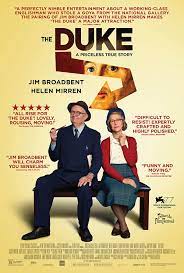
THE DUKE
UK, 2020, 96 minutes, Colour.
Jim Broadbent, Helen Mirren, Anna Maxwell Martin, Fionn Whitehead, Matthew Goode, James Wilby, Richard McCabe.
Directed by Roger Michell.
There was a joke at the time, 1962, which is reprised in this drama, Kempton Bunton and his wife in the cinema watching James Bond in Dr No. Bond admires Goya’s portrait of the Duke of Wellington, stolen by Dr No. In fact, the public knew that it had been stolen from the National Gallery. The Duke tells the story of what happened behind the scene as well as the media response.
The film opens with Kempton Bunton in court, charged with the theft of the portrait. Bunton is a cheerful man, pleading not guilty, starting to make his case. And then the screenplay goes back six months, offering a portrait of Bunton, defying the police concerning everyone paying the television licence, eliminating BBC reception so that he was within the law of not paying. Bunton is a working class man, committed to the cause of humanity, standing on street corners seeking petitions, to claiming his stances in public. His played marvellously by Jim Broadbent. Meanwhile, at home, there is his long-suffering wife, reminding us that Helen Mirren can play cleaning ladies as Well Is Queen Elizabeth convincingly, and a young son, Jackie (Fionn Whitehead). And there is grief for and daughter, long dead in a bicycle accident, reticence at home, but Kempton writing plays (never produced) about his daughter.
Then the theft of the painting and its finishing up in Kempton’s cupboard, a forced cupboard back supplied by his son.
Headlines, police intervention, Home Secretary concerned, speculation about gangs of professional art thieves… The media taking up the case.
Meanwhile, at home, Kempton getting jobs, losing them, standing up against worksite bullying, sending his plays to theatres… And the big plan that giving back the painting would mean a reward of £140,000 to be devoted to charities (and just think how many television alliances licenses that would cover).
Kempton returns the painting, arrested, and his trial, his defence lawyer played by Matthew Goode. Kempton, of course, can be quite the orator, which means that the Gallery, the jury, and some of the lawyers are entertained. While being acquitted generally of the crimes, he does receive a three month sentence because the frame had disappeared, meaning that he was guilty of this theft.
There is quite an unexpected twist towards the end which makes Kempton an even better man. It can be said that his family collaborated in giving information for the making of The Duke.
In a way, the film is slight, perhaps parochial in its portrait of Britain in the early 1960s, the heritage of the Duke of Wellington and Waterloo, the British spirit – manifested after the jury’s decisions with the Gallery and everyone bursting into national spirit singing Jerusalem. But, with Jim Broadbent and Helen Mirren, this is a reminder that even with slight stories, we can be impressed as well as entertained by expert performances.
- The title? The Duke of Wellington, Goya’s portrait, National Gallery, stolen, in ransom, restored?
- The story based on actual events, characters, family reminiscences of Bunton?
- Northern England, the cities, homes, streets, shops, squalid areas, taxis, bakers, atmosphere in 1961? The contrast with the wealthy house?
- The courts, the hearings, the Gallery? Prison sequences? The musical score?
- The story of Kempton Bunton, Jim Broadbent’s presence and performance? Age, marriage, long-suffering wife, their son, at home? Kempton’s political beliefs, the issue of the BBC license, the officials arriving, his answers, cutting off the BBC and therefore not required to pay? The taking of the painting, the ransom – and how many BBC licenses it would pay? His standing on street corners, with his son, in the rain? Philosophy of life? Politics?
- The film opening in the courts, the accusations, the response of the Gallery, the judge? The context of the flashbacks?
- Kempton’s wife, a cleaner, Helen Mirren’s presence? Exasperated with her husband, his appeal to humankind, her wanting a focus on the family? Seeing him on the street corner? Her work with the lady of the house, friendship, yet servant?
- The story of the painting, Kempton going to London, the visuals of the taking of the painting, getting inside the Gallery, taking the painting, Edvard Munch’s behind it? Taking it home? Hiding it in the cupboard, the son building the false wall? The couple staying in the room, the discovery of the partition, of the painting, the girl and her money ideas? Kempton’s wife, the discovery, dismay? His not having talked with her?
- The son, his friends, criminal activity, the welcome into the Bunton house? Behaviour, the sexual episode? Going out to the restaurant?
- Writing to papers, offering the ransom for charity, the reaction of the lawyers, of the police, suspecting a professional gang and Kempton laughing? The Home Secretary and his reaction?
- Kempton restoring the painting, the arrest, the trial, his earnest representation of himself, the discussions with his lawyer, the shrewdness of the lawyer, explanations of the situation? The judge, interventions? The other members of the bar? The Gallery, mistaking the statement of not guilty for the verdict? Does present in the Gallery, his son, the vigorous response of the owner of the house, her interventions? The arguments, the not guilty verdicts, the three-month verdict, the whole group singing Jerusalem?
- Kempton, in prison, three months, his wife’s visit?
- The revelation of the truth, the son having stolen the painting, the hiding of it, Kempton taking the blame?
- A very British story, almost parochial in its spirit, details – and the Jerusalem patriotism?
RIP, Sister Floriane Melinz MSC
RIP, Sister Floriane Melinz MSC

We offer our condolences to our MSC Sisters and celebrate the long missionary life of Floriane, Croatia, Germany, PNG/ New Britain (37 years), Melbourne
“Follow me.” Mt. 4:19
Sr. Floriane MSC – Stephanie Melinz
Born: 10-11-1930 in Turbe, Croatia
First Profession: 3-2-1952
Entered Eternal Life: 23-2-2022 Kew, Vic

Sr.Floriane heard the Lord’s call while very young and it never left her heart. In spite of facing many difficulties throughout her life, she responded faithfully and strongly to whatever she believed the Lord was asking of her.
Floriane was born into a large and loving Catholic family in Croatia. When she was about ten years old, her parents made the enormous decision to flee their beautiful homeland because of the political changes which were bringing intense persecution to the Church. As refugees they travelled to Germany and were eventually housed in a Refugee Camp. Young Stephanie found the local Catholic Church and involved herself in the youth groups and visitation of the sick.
After the War, when at last the family had the opportunity to migrate to Australia, Floriane expressed her desire to remain in Germany and follow the ‘call’ she felt to be a Missionary and to serve in a Leper Colony. One can only imagine the sacrifice this entailed for her dear parents and family. Floriane was accepted as an aspirant at Hiltrup and her family left for their new country.
At the completion of her Novitiate, she had the joy of being sent to Papua New Guinea where she spent the next thirty-seven years. Her desire to work with Lepers was granted when she was sent to Anelaua. However, owing to some health issues which arose for her there, she was moved to Tapo. Later she served on the very remote Tanga Island and after at Bitokara and Ulamona. In each of these places she looked after the household needs which included cooking. Through the years she shared her many and practical talents with the local people. She had a special place in her heart for the Youth and explored many ways of engaging them in practical activities and in sport. Her dear family in Australia generously supported her projects through the years.
In 1992, while in Australia for a home visit and a Renewal Course, she became aware of a new ‘call’. It was to assist her family, all of whom now had young families of their own, in the care of their elderly mother. Permission was given and she spent the next few years in the midst of the family where she became the beloved Aunt of all her nieces and nephews. She officially joined the Australian Province in 1994.
It was following the death of her dear mother that Floriane moved to Melbourne. Here, with Sr. Theonatis, she responded to the need for Pastoral Care at the Aged Care Facility for German speaking people in the suburb of Bayswater. Once more her love, faithfulness and generosity were experienced by all with whom she came in contact. Residents, staff and local parishioners all came to love her.
Floriane eventually moved to the Hospitality House where her practical talents have again been shared with all who visit. She was a person of great inner strength, warm hospitality and generosity of spirit. One of her joys in these last years was tending her garden where, as someone remarked, she could encourage new life in the most needy of plants.
As time went on, the cancer, detected about five years ago, gradually took over. However, her inner strength, which was built on her very deep faith and her love of the Lord and his dear Mother, sustained her throughout. Her last few days were spent at Caritas Christi Hospice for the dying where, on Wednesday, just as the dawn began to light up the morning sky, she died peacefully.
We give thanks to God for this wonderful companion, and we thank her dear family for sharing her with our M.S.C. Congregation. May Floriane delight now in the company of the One who called to her – “Follow Me.”
“I am espoused to Him whom the Angels serve,
Whom the moon and stars admire.” (Final Profession Liturgy)
On Thursday 10th March at 11.00 am we will gather at Our Lady of Good Counsel Church in Deepdene for Requiem Mass and then accompany Sr. Floriane to the Eltham Cemetery.
On behalf of the Missionary Sisters of the Sacred Heart of the Australian Province,
Carmel Slattery MSC.
Carmel at the burial.
Thanks for photos: Carmel Butler MSC
Australian MSC Province unusual statistic. Did you know?
Australian MSC Province unusual statistic. Did you know?
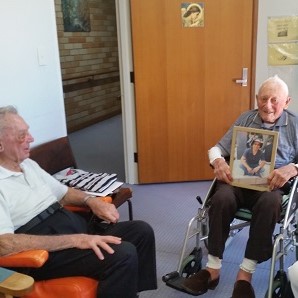 Kevin and John
Kevin and John
Over the years, the Australian Province has had quite a number of brothers, family brothers that is. But, in looking at the names, it seems that there are 22 sets of brothers in the Province history. There are also 7 confreres who had brothers who were professed and left. There are also 2 sets of brothers who both left.
It means that the Province had 31 sets of brothers who joined. We wonder whether this is comparable to any other MSC province, or other religious congregation, or diocese.
The list may bring back memories.
First of all we have to acknowledge two families of 3 who joined.
Henschkes, George, William and Phil. (A brother bishop of Wagga, brother Vin retired to Douglas Park, and a sister OLSH who was a Provincial.)
Fallons, Jim, John and Michael (and a cousin, Terry)
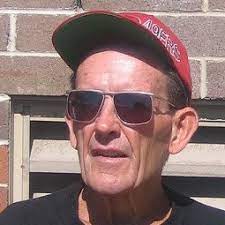
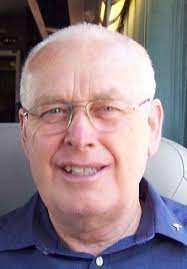
Andersen Russ and Frank
Bosman Henk and John
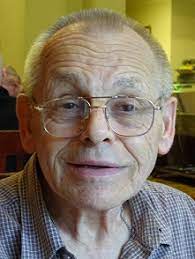
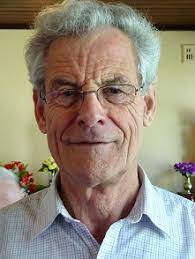
Braithwaite Arthur and John
Dwyer Vin and James
Ehlefeldt John and Kevin
Forrest Michael and John
Guy Peter and Paul
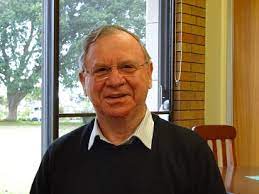 No photo of Paul available - but they are identical twins
No photo of Paul available - but they are identical twins
Hawe Dan and Nick
Howley Bob and Andy
Jordan Harry and Con
Malone Peter and Philip
McGhee John and Kevin
McMahon John and Jim
McManus John and Leo
Mooney John and Bede
O’Sullivan Donal and Finbar
Perkins Arthur and Maurice
Reis Stan and Michael
Smith Don and Doug
White Kevin and Brian
And remembering, Pattersons, O’Carrigans, Cuneos, Powers, Doggets, Taylors, Jennings, Collins, McGuigans, Cantwells (there were three others), Reieses (there were also three more) and Maggs and Hanrahans.
That’s another 13 to add to the 22 above. 35.
We have not listed confreres who had brothers in the Apostolic School or the novitiate – which would enhance the statistic.
Quite a number of members had priest brothers in dioceses and orders.
Brian Gallagher, Albert Chan, Ignatius Allman, Vince Carroll, Frank Ryan,Ed Travers, Adrian Meaney, Bernie Smith, Max Douglas, Bob Dando, Bill Rigney, the Henschkes, Ken Clancy, George Tweedy. (14)
And, adding that to the 35 – 49 sets of brothers.
(The Dwyers with 2 Brothers, De La Salle, Patrick O’Carrigan with a Christian Brother brother.)
Acknowledging Edmond Travers MSC, 80
Acknowledging Edmond Travers MSC, 80
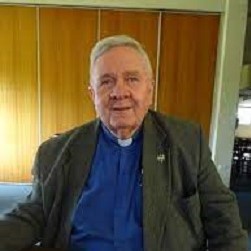
March 11th, Ed Travers turns 80.
Ed’s background is farming, South Australia. He was one of the original ‘late vocations’ to join the MSC in 1967. His brother, Basil, a priest of Port Pirie diocese.
He made his novitiate with Bob Mitchell MSC and was professed, February 27th, 1968.
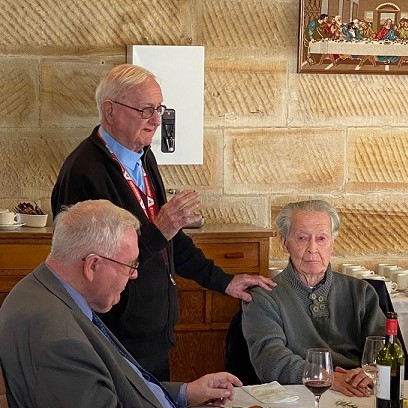 '
'
With co-novices and in studies at St Paul's, Arthur Stidwell and Len Helm
Ed was also one of the first students at St Paul’s National Seminary, ordained 13th August 1971.
Ed served in a number of parishes from Tasmania, Moonah, to Darwin, Nightcliff.
He did spirituality studies in Chicago, followed by other courses, leading to his qualifications as a Spiritual Director and some years as Director of the Retreat House at Douglas Park.
He has been a Spiritual Director at the Diocesan Seminary in Sydney, and recently requested to continue with this ministry.
He lives at the Chevalier Resource Centre, Kensington.
And remembering jubilee celebrations at Douglas Park, 2021.
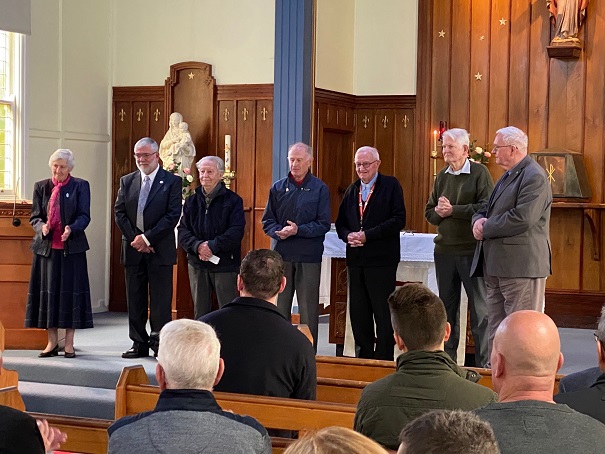
Treand House: Advertisement
Treand House: Advertisement

Business/Operations Manager
Catholic Religious Congregation
Location: Coogee, Sydney
The Missionaries of the Sacred Heart, Australian Province, has around 140 members and their ministries include Parishes; mission both locally and overseas – Northern Territory, Vietnam, Japan, Fiji, and PNG; a Retreat Centre; Education (four Colleges); Chaplaincy; and Aged Care.
The Missionaries of the Sacred Heart Australia are part an international order of Brothers and Priests, within the Catholic Church, numbering about 1,900 members who work in over fifty-five countries, on six continents.
Reporting to the Provincial of the Australian Province, this role has responsibility for a broad range of financial and commercial matters for the Australian Congregation, both strategic and day-to-day.
If you are an experienced, hands-on finance and accounting practitioner and seek a role which is energised by the organisation’s mission, then please visit traksearch.com to obtain further information.
To express your interest, simply send a resume from the Trak Search website; or by email to This email address is being protected from spambots. You need JavaScript enabled to view it. quoting ref number TS1477. Enquiries are also welcome to John Chesher on 0417 068 220.
Closing Date: Monday 28th March 2022
A Chevalier College Lent story, from John Franzmann MSC
A Chevalier College Lent story, from John Franzmann MSC
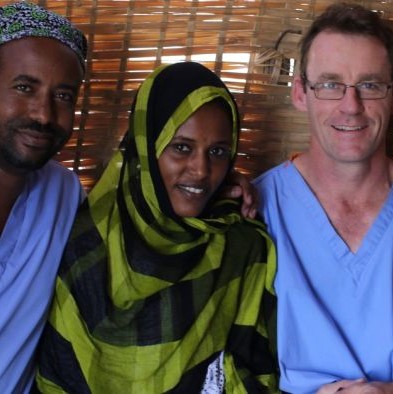
We thought many of you may wish to read Fr John Franzmann's homily on Ash Wednesday which focuses on a Chev Past Student's amazing charity work.
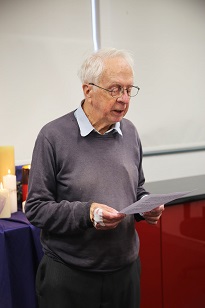
I want today to speak of another who spends his life helping the less fortunate. This time he is a Chevalier past student. His name is Dr Andrew Browning. He spoke in Bowral last year, and some of you may have heard him or heard of him.
He went to Bowral Primary, and then came to Chevalier. He was in the year 12 class of 1987. He went on to do a medical degree. He said, “As a Christian I always wanted to be a missionary doctor”. He had heard about the needs of Africa from a returned missionary who spoke to the children at Sunday School at St Jude’s.
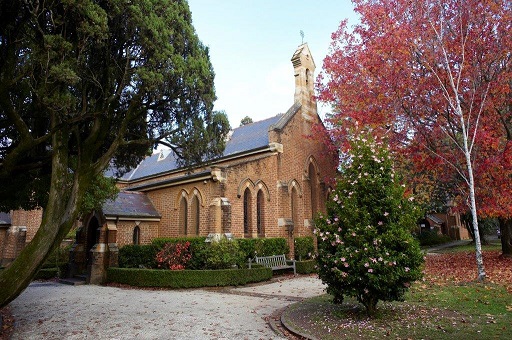
Andrew’s father was an obstetrician, but Andrew said “I swore I’d never be an obstetrician - he was always at work, always up at night. In fact the first thing I did as a medical student with him at Bowral was a hysterectomy, and I fainted”
But then he visited Africa. His aunt Valerie, his father’s youngest sister, was a nurse who worked from age 22 in Ethiopia, then in a Sudan refugee camp, and in Eritrea and Somalia. Andrew met her when she visited home when he was 9 or 10. He was very impressed by her. “I used to talk with pride about how my aunt was helping people. She was doing such exciting and worthwhile work.”
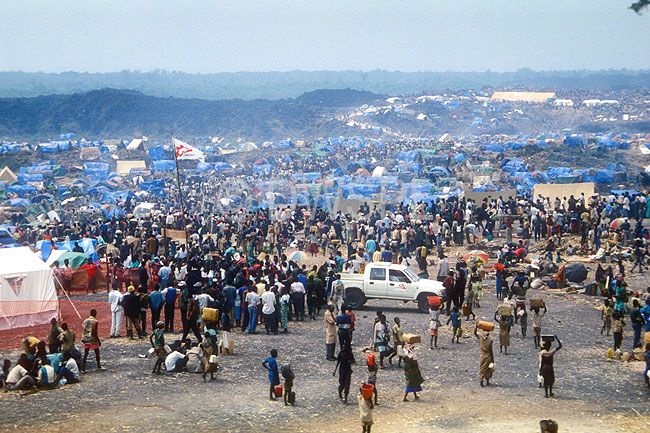
Refugee camps in Tanzania
Andrew went to work with her. “I did my medical elective in Tanzania in 1993 working in Rwandan refugee camps, and decided that as a Christian, this was how I should live my life - by bringing some relief to suffering.
Then he was asked to come and work in Africa at a hospital that specialised in the problem of fistula. This is a problem that happens to women when they have difficulty delivering their babies. It can result in death, or in years of great suffering. It is not known in the West, where women have access to good obstetric care, but is a big problem in Africa where care can be very basic or non-existent. For example, in Ethiopia there are about 9000 new cases each year.
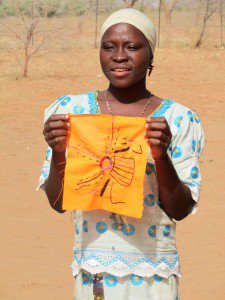
Fistula
As Andrew says of our Australian understanding of it, “It’s hidden away, not happening at our front door. Its mostly in rural Africa and South-East Asia. It’s not happening in our face. so we don’t react. It takes a global effort - those countries don’t have resources to tackle it, but we do.”
So Andrew went off and studied obstetrics after all, and came back and worked in Africa.
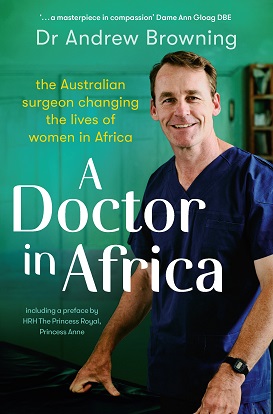
MSC in Bogota, Colombia
MSC in Bogota, Colombia
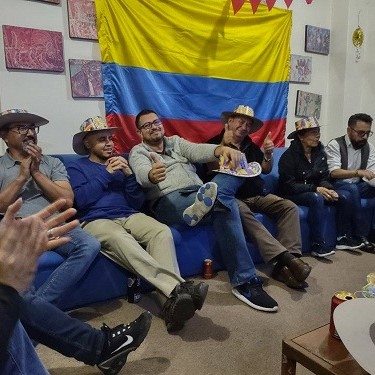
The MSC Foundation in Colombia was made by the American MSC. Mark McDonald, former Superior General, was one of the American MSC who worked there.
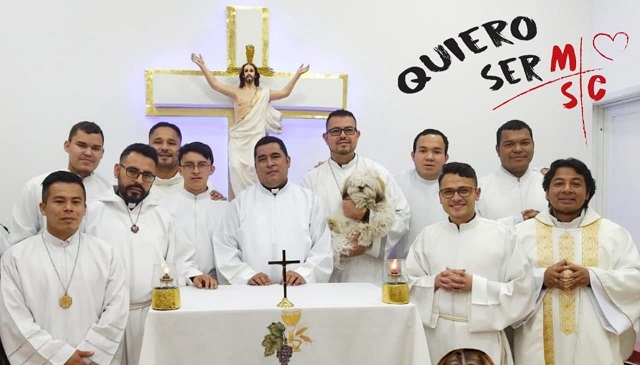
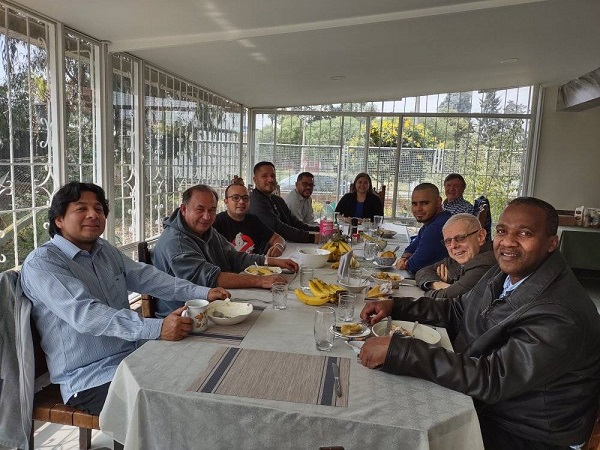
23rd February saw Final Professions. We remind you that you are all welcome to the Holy Eucharist today Wednesday February 23 at 12 noon, in which our Brothers Raul and Ricardo will profess their eternal Votes as Missionaries of the Holy Heart of Jesus (There’s that Facebook translation of Eternal Votes for Perpetual Vows – and the Holy Heart,)
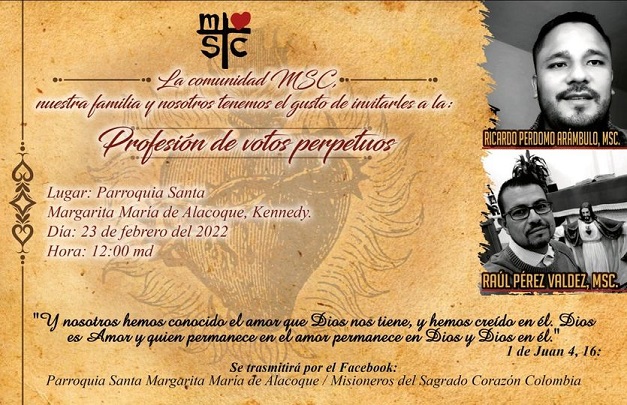
Jim Miller MSC writes: In Bogota, Colombia with our MSC brothers and young men in formation. Raúl, whom I had in initial formation in Chicago, along with Ricardo are progressing their final vows as MSC. Welcome into our MSC family!
